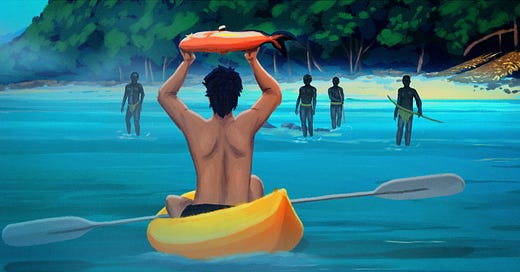'The Mission' shows all sides of a missionary’s tragic end
Plus, Alexandra Pelosi’s latest political documentary is her usual pointless drivel
When I first heard the story of John Allen Chau, the American missionary who was killed in 2018 while trying to visit and proselytize to one of the world’s most remote Indigenous tribes, I’m pretty sure what my reaction was: Who did this guy think he was? Who was he to commit the imperial —not to mention illegal — act of disturbing these people, or believing it was necessary to convert them to his religion?
A new documentary called The Mission, out in theaters now from National Geographic and Picturehouse, tells Chau’s entire story and explores all sides of the story with nuance and compassion. It recalls Herzog’s Grizzly Man, not to compare the Sentinelese tribe to Alaskan grizzly bears.
Chau, who was just 26 years old when he died, was an Alabama native who grew up obsessed with exploration. A convert to evangelical Christianity and graduate of Oral Roberts, he was a veteran missionary who made multiple attempts to reach the Senitelese, a tribe on an island in the Indian Ocean that has long resisted contact with the outside world.
The exact circumstances of Chau’s death are unclear, but he’s believed to have been struck by arrows.
Are we supposed to think his act was a disgusting one, and he basically deserved his fate? Or that he was merely an overzealous believer, who took things a little too far, a la Timothy Treadwell?
After watching The Mission, I’m not quite sure what to make of Chau, and I don’t know that the film does either. And honestly, I give it credit for that.
The Mission was directed by the team of Amanda McBaine and Jesse Moss, whom I interviewed back in 2020 when they made Boys State, an illuminating but somewhat horrifying documentary about a mock government exercise among teenaged boys in Texas.
The film utilizes Chau’s journals, and those of his father Patrick, while using actors to read from them. There is, of course, no existing footage of Chau’s final moments, so they’re re-enacted with animation.
A picture is painted of Chau as an earnest young man, a committed believer, who appeared to have good intentions, even if the actual effect of them was anything but.
Various interview subjects have different takes, with some implying that he was brainwashed by the evangelical Christian world.
We’ll get to discuss it again in a couple of years, because a feature film, called The Last Days of John Allen Chau, is on the way, directed by Justin Lin.
The Insurrectionist Next Door
Alexandra Pelosi may be my least favorite working documentary filmmaker. The daughter of the former House Speaker, Pelosi averages a new documentary a year, looking at American politics and culture from about the most shallow lens one can possibly imagine. And I say that as someone who, generally, admires her mother, Nancy Pelosi.
Pelosi’s M.O. generally entails finding the most ridiculous people she can, pointing the camera at them, and asking them wildly condescending questions. Her American Selfie, from 2021, pivoted from mocking people who overuse their smartphones to chronicling what followed the killing of George Floyd- which was filmed, of course, with a smartphone.
In her latest film, The Insurrectionist Next Door, now streaming on Max, Pelosi visits about a half dozen people who were convicted for their participation in the January 6 Capitol riot, in which Pelosi’s mother was a likely target of the rioters.
January 6 also formed the culmination of the filmmaker’s previous movie, Pelosi in the House, in which some footage found its way into the January 6 Committee hearings. I joked at the time that the Committee footage was the first portion of Alexandra Pelosi’s work that I’d ever liked.
Sure, some of the interviewees have surprising backgrounds and hobbies. One guy used to be a pro wrestler, another had a brief career in adult films. One guy is a parkour enthusiast — though his ankle monitoring bracelet now gets in the way — and another is openly gay and likes wine. Two of the subjects, a brother and sister, have such a bizarre relationship that it probably could have been its own documentary.
But for the most part, these people are exactly who you thought they were, which is to say, violent idiots. The common clay of the new West. You know, morons. Pelosi keeps trying to humanize them when really they’re at best in over their heads, and at worst, actively malevolent.
Most have little to no remorse, and remain supporters of Trump (except for the guy whose sister dragged him to January 6- he says he voted for Biden.) Except for one guy, no one here buys into the Tucker Carlson lie that the whole attack on the Capitol was a fed operation.
That the riot that day specifically targeted the filmmaker’s mother is something that’s brought up in passing, mostly as part of jokes; Pelosi does not mention the part where a MAGA adherent, looking for her mother, violently attacked her father in his own home. Then, the leading lights of that movement made up a baseless story that he was attacked by a gay lover and kept it up for months after it was debunked. If I were her, I wouldn’t be so eager to “humanize” the foot soldiers of a political movement that openly wants both of her parents dead.
January 6, in addition to having taken place on live television, has been the subject of numerous documentaries already, which really puts a lie to the notion that the Capitol attack was a hoax. Still, it’s almost shocking how little The Insurrectionist Next Door adds to our understanding of that day.
When it comes to interactions with the January 6 defendants in which the interviewer is someone with famous parents, I’ll take Ronan Farrow over Alexandra Pelosi any day.




